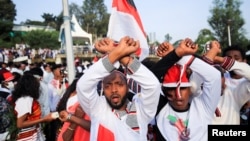"While the talks have been largely constructive, unfortunately, it was not possible to reach an agreement on some issues during this round of the talks," the Ethiopian government stated, without elaborating on the sticking points.
It added however: "Both parties have acknowledged the need to continue these talks with a view to resolving the conflict permanently and peacefully."
The OLA, which has been listed as a "terrorist" organization by the Ethiopian authorities since 2021, issued an almost identical statement.
"While understandings were reached on some outstanding issues, unfortunately it was not possible to reach an agreement on key political matters during this round of talks," it said.
The OLA, an armed insurgent movement from the country's Oromia region, has been fighting Addis Ababa since it split in 2018 from the Oromo Liberation Front (OLF) when that group renounced armed struggle.
The OLA's strength, estimated at a few thousand men in 2018, has increased significantly in recent years, though observers believe it is insufficiently organized or well-armed to pose a real threat to the federal government.
Oromia, which surrounds the capital Addis Ababa and is Ethiopia's largest and most populous region, has suffered ethnic massacres in recent years carried out by unknown groups.
The OLA has been repeatedly accused by the government of Prime Minister Abiy Ahmed - himself of Oromo descent - of being responsible for the killings, a charge it denies.
The government is accused of waging an indiscriminate crackdown that has fueled Oromo resentment against the central government.
The Oromo community, Ethiopia's largest ethnic grouping, has long complained of marginalization.






